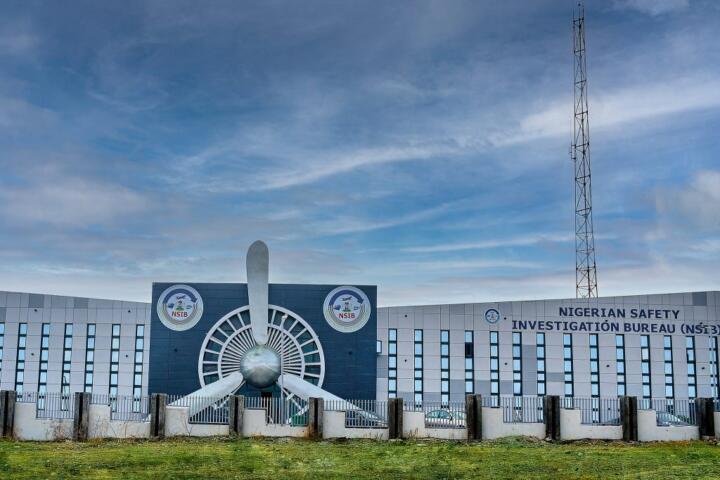The Federal Government is reportedly considering moving the Nigeria Safety Investigation Bureau (NSIB) from under the supervision of the Ministry of Aviation to the Office of the President, a move believed to streamline oversight and reinforce regulatory independence. The potential shift is part of wider aviation sector reforms aimed at enhancing safety, improving responsiveness, and ensuring consistent funding for the bureau’s operations.
Currently housed within the aviation ministry, the NSIB plays a critical role in investigating air accidents and incidents, making safety recommendations, and issuing periodic safety trends and alerts. However, industry stakeholders have expressed concerns about its perceived lack of autonomy and the delays in implementing its recommendations, often blamed on bureaucratic layers and inconsistent funding.

Multiple sources within the aviation sector suggest that the proposal to relocate the bureau is part of ongoing discussions among the Presidency, the Ministry of Aviation, and aviation regulatory agencies. Proponents argue that embedding the bureau directly within the Presidency would grant it greater authority, enable swifter execution of its safety mandates, and facilitate seamless collaboration with other government agencies, including agencies responsible for security, airspace management, and infrastructure.
Officials familiar with the matter note that the NSIB’s current position under the aviation ministry subjects it to administrative delays in budget approval and policy implementation. Moving it to the Presidential Office could deliver more direct access to budget lines, reduce bureaucratic inertia, and elevate the bureau’s visibility in scheduling and carrying out investigations.
Nigerian aviation experts say that an autonomous NSIB is a cornerstone for improving safety oversight in an industry grappling with aging infrastructure, pilot shortages, and stretched accident investigation capacity. The bureau’s ability to conduct prompt, independent investigations—free from external influence—is seen as essential to building public confidence and attracting foreign airline investments.
Some officials also contend that the move would align Nigeria’s safety structure with international standards. In many jurisdictions, accident investigation bodies operate independently or report directly to the executive, thus ensuring that findings are acted upon without delay or conflict of interest.
However, critics caution that relocating the NSIB alone may not solve underlying issues unless supported by structural adjustments. They argue that the bureau’s mandate must be backed by enabling legislation to guarantee functional independence, enforceable powers, and access to international technical partnerships and training.
Some lawmakers and regulatory insiders say that to deliver real impact, the bureau must be equipped with statutory authority to implement its safety recommendations, leverage sanctions where necessary, and publish findings transparently. They propose that relocation to the Presidency should be accompanied by legal reforms that establish clear reporting lines, accountability mechanisms, and coordination frameworks with the Nigerian Civil Aviation Authority (NCAA) and other stakeholders.
Industry stakeholders believe that if properly supported, the move could deter accident-prone practices by signaling stronger enforcement and accountability. Airlines, airport operators, and service providers may feel greater pressure to comply with safety advisories, conduct internal audits, and proactively report safety issues, reducing systemic risks and enhancing Nigeria’s position within global aviation networks.
There may also be broader ripple effects. A stronger, higher-profile safety investigation bureau could attract international cooperation and training opportunities, helping local investigators acquire global-standard skills. This could bolster Nigeria’s capacity to conduct domestic investigations according to the International Civil Aviation Organization’s (ICAO) best practices, a critical factor in maintaining flight confidence and insurance credibility.
That said, some stakeholders emphasise that relocating the bureau will likely require adjustments in the national budget. Presiding over aviation safety within the Presidency could potentially elevate the NSIB’s funding priority alongside other executive agencies. It is hoped the move would bring more predictable funding cycles, allowing the bureau to invest in training, data systems, and equipment for flight data recorders, autopsy labs, and simulation tools.
The federal government is also cautious about ensuring that the relocation does not create overlap or confusion among agencies. Policy architects are advised to clarify the NSIB’s relationship with the NCAA, the Accident Investigation Bureau (AIB), and other oversight bodies, ensuring that each agency’s mandate remains distinct and collaboration is structured.
Speaking with regulatory officials, it was noted that discussions are still preliminary and that a formal announcement, if any, would likely follow stakeholder consultations—operating agencies, aviation unions, safety professionals, and lawmakers in the National Assembly. It is understood that the presidency is reviewing options and will only proceed after broad buy-in and possible legislative adjustments.
Observers say the potential move could also coincide with broader aviation reforms, such as improvements in airport operations, safety systems upgrade, and clearer lines of command among the aviation regulatory ecosystem. Strengthening the NSIB is seen as part of a wider initiative to raise Nigeria’s safety ratings and meet global compliance scores leveraged by international aviation bodies.
While faith remains cautious, many experts see this initiative as a step in the right direction. If implemented with legal backing and budget commitments, shifting the bureau under the presidency could mark a turning point in how aviation safety is managed in Nigeria. It could help ensure that safety investigations are treated with the urgency and independence they deserve, enhancing transparency and reducing delays in implementing corrective measures.
Ultimately, proponents argue that safety is not an optional layer but a foundational requirement for the aviation industry. By elevating the NSIB to a level directly under the President, the government would be sending a strong message: that aviation safety is a national priority, demanding direct executive oversight and unwavering commitment.
As Nigeria explores the way forward, aviation watchers and public safety advocates will continue to monitor progress. Success will depend not just on administrative reshuffling, but on legal reform, adequate funding, and sustained political support. If these elements fall in place, relocating the NSIB to the Presidency could become a significant milestone in Nigeria’s aviation safety journey—and a model for future reform efforts.
Support InfoStride News' Credible Journalism: Only credible journalism can guarantee a fair, accountable and transparent society, including democracy and government. It involves a lot of efforts and money. We need your support. Click here to Donate
